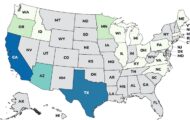The outbreak of Salmonella infections linked to imported Maradol papayas is over, according to the Centers for Disease Control and Prevention (CDC). This large Salmonella Papaya outbreak was comprised of four separate outbreaks linked to four different farms in Mexico. Of the 251 people sickened in 25 states, 79 were hospitalized. One death was reported from New York City and one death was reported from California.

The Salmonella papaya outbreaks included these types of Salmonella bacteria: Thompson, Kiambu, Agona, Gaminara, Senftenberg, Urbana, Newport, INfantis, and Anatum. The outbreak strains of bacteria were found in samples collected from papayas and from ill persons. A total of 236 people were sickened in 23 states.
Overall, illness started on dates ranging from December 20, 2016 to October 4, 2017. Ill persons ranged in age from less than 1 year to 95, with a median age of 40. Among ill persons, 62% were female, and among ill people interviewed, 67% were Hispanic.
The first outbreak, the largest, sickened 220 people in 23 states. This outbreak was linked to Maradol papayas from the from the Carica de Campeche farm in Tenabo, Campeche, Mexico. The case count by bacterial strain in this outbreak was: Salmonella Thompson (144), Salmonella Kiambu (54), Salmonella Agona (12), Salmonella Gaminara (7), and Salmonella Senftenberg (3). Illness onset dates for this outbreak ranged from May 17, 2017, to October 4, 2017.
The second outbreak sickened seven people in three states with Salmonella Urbana infections. Illness dates for that outbreak were from July 23, 2017 to August 14, 2017. Four people were hospitalized. Papayas imported from the El Zapotanito farm in La Huerta, Jalisco, Mexico were linked to this outbreak.
The third outbreak sickened four people in four states with Salmonella Newport and Salmonella Infantis infections. Illness started on dates ranging from July 19, 2017 to August 7, 2017. Two of the patients were hospitalized.
And the fourth outbreak sickened twenty people in three states with Salmonella Anatum infections. Illness onset dates ranged from December 20, 2016 to August 16, 2017. Those papayas were imported from the farm Productores y Exportadores de Carica Papaya de Tecomán y Costa Alegre in Tijuana, Baja California, Mexico. One death in California was reported in this outbreak; five people were hospitalized.
Most of those interviewed reported buying papayas from the grocery store and eating them the week before they got sick. Officials used the PulseNet database system to find other persons in these outbreak groups. They also relied on testing, which showed that the outbreak strains of Salmonella bacteria were found on the imported papayas and on isolates taken from ill persons.
Several recalls were issued during these Salmonella papaya outbreaks. And the FDA placed import restrictions on imported papayas from several farms in Mexico during the outbreaks.
It’s important to note that Salmonella illnesses are vastly underreported. Public health officials use a multiplier of 38 when estimating the numbers sickened in these outbreaks. That means there could have been more than 9,500 people sickened across the country.
If you have been experiencing the symptoms of a Salmonella infection, which include nausea, vomiting, a fever, abdominal cramps, and diarrhea, and have eaten imported papayas this year, see your doctor. Even when you recover after this infection, you could experience long term health consequences, including reactive arthritis and high blood pressure.
Pritzker Hageman law firm represents and helps people who have been sickened by contaminated food such as the I.M. Healthy product, and helps families whose loved ones have died after these infections. We get answers, compensation for those who have been injured, and justice through our work. Our lawyers represent families of patients sickened with bacterial infections in personal injury and wrongful death lawsuits against growers, importers, retailers, grocery stores, food processors, restaurants, daycare centers, schools, and others. Attorney Fred Pritzker and his team recently won $7.5 million for young client whose kidneys failed because of hemolytic uremic syndrome after an E. coli O157:H7 infection. Please note that class action lawsuits are usually not appropriate for outbreak victims because these types of cases are very unique.




